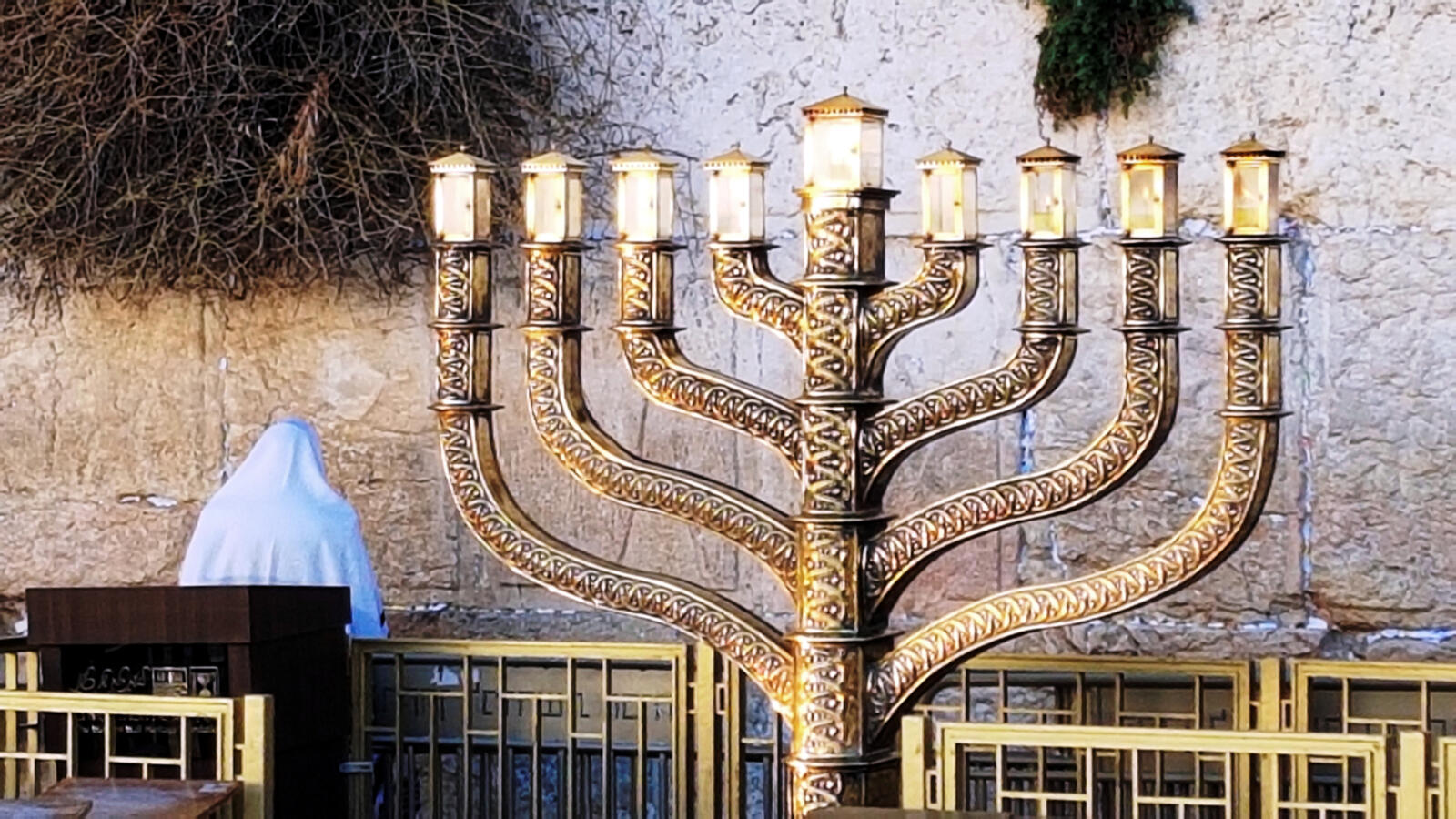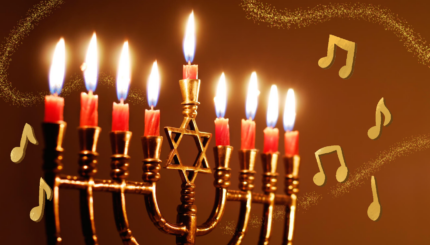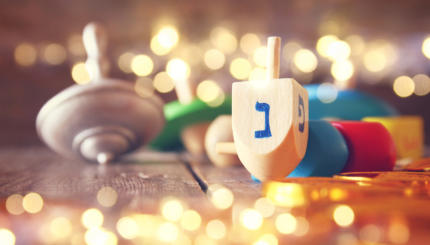Hanukkah is a post-biblical holiday. This means that both the holiday, as well as the events it commemorates, happened after the books of the Bible were written. There is nothing at all in the Torah about Hanukkah which is one of the reasons that — unlike Passover, Shavuot and Sukkot — Hanukkah is considered a minor holiday.
The fact that Hanukkah developed later and is not found in scripture has another, lesser-known consequence: There were, in antiquity, many different ideas about what the holiday means and how it came about, some of which we’re willing to bet you haven’t heard before. In this article, we will explore them.
The Familiar Hanukkah Story (Talmud)
The story of Hanukkah, as most people tell it today, is tied to the 2nd century BCE revolt against the Syrian-Greeks. Antiochus IV Epiphanes conquered the land of Israel, forbade Jewish practice, and took over the Jerusalem Temple — making it a shrine to their gods. But a brave band of fighters, led by the Maccabees, beat back the Greeks, recaptured the Temple and even established Jewish self-rule in the land of Israel.
So why do we celebrate Hanukkah for eight nights? The Talmud, Judaism’s other central sacred text, asks this very question. Indeed, the fact that the rabbis ask about it signals to us that it was not widely agreed in their day. On Shabbat 21b we find this:
With your help, My Jewish Learning can provide endless opportunities for learning, connection and discovery.
What’s so special about Hanukkah that the sages taught: “Starting on the 25th of Kislev, the days of Hanukkah are eight. One may not eulogize on them and one may not fast on them”?
Shabbat 21b
The Talmud, responding to its own question, provides an answer that is familiar to us:
When the Greeks entered the Temple they had defiled all the oils that were in the sanctuary. When the Hasmonean (Maccabee) monarchy overcame them and emerged victorious over them, they searched and found only one cruse of oil that was placed with the seal of the high priest, undisturbed by the Greeks. And there was sufficient oil there to light the candelabrum for only one day.
A miracle occurred and they lit the candelabrum from it for eight days. The next year, they instituted those days and made them holidays of praise and thanksgiving.
Shabbat 21b
The story of the miracle of the oil that lasted for eight days is, perhaps, the most well known of Hanukkah’s origin stories. It’s what is usually found in children’s books, told in Hebrew schools and recalled at Hanukkah parties. But it’s not the only one.
Alternative #1: A Holiday of Rededication (1st Maccabees)
While Hanukkah occurred too late to be included in the Bible, there is no shortage of ancient texts that report about it. First Maccabees is one such book. (It’s called “first” because there are actually a number of ancient books named for the Maccabees.) While it was never incorporated into the Jewish Bible, it was preserved as a part of the Catholic Bible. It was, however, composed by a Jewish author, in Hebrew, a generation or two after the events about which it reports, is one of the earliest to tell the story.
1st Maccabees reports how, victorious in battle, Judah Maccabee and his brothers lead their troops to the site of the Temple, which they find in disarray. They set about purifying the site:
Early in the morning on the twenty-fifth day of the ninth month, which is the month of Kislev … they rose and offered sacrifice, as the law directs, on the new altar of burnt offering which they had built … they celebrated the dedication of the altar for eight days, and offered burnt offerings with gladness; they offered a sacrifice of deliverance and praise … Then Judas and his brothers and all the assembly of Israel determined that every year at that season the days of the dedication of the altar should be observed with gladness and joy for eight days, beginning with the twenty-fifth day of the month of Kislev.
1 Maccabees 4:52-59
The dedication of the tabernacle, the original structure the Israelite built to worship God while they were still wandering in the wilderness, was eight days long (Leviticus 9:1-24). Similarly, says this text, was the Maccabees’ celebration to rededicate the Temple eight days long. Given the significance of the moment, they established Hanukkah as an eight holiday to commemorate the rededication of the Temple each and every year.
Alternative #2: A Late Sukkot Celebration (2nd Maccabees)
Second Maccabees, originally written in Greek, is not a sequel, as the name suggests. Instead, it also recounts the same events as 1st Maccabees, but according to the perspective of a completely different author. While the chronologies of the two books are parallel, the style and details are different, including their explanation of the celebration of the first Hanukkah. Second Maccabees reports:
Now Maccabeus and his followers, the Lord leading them on, recovered the Temple and the city … They purified the sanctuary, and made another altar of sacrifice; then, striking fire out of flint, they offered sacrifices … and they burned incense and lighted lamps and set out the bread of the Presence … And they celebrated it for eight days with rejoicing, in the manner of the Feast of Booths (Sukkot), remembering how not long before, during the Feast of Booths, they had been wandering in the mountains and caves like wild animals. Therefore bearing ivy-wreathed wands and beautiful branches and also fronds of palm, they offered hymns of thanksgiving to him who had given success to the purifying of his own holy place. They decreed by public ordinance and vote that the whole nation of the Jews should observe these days every year.
2 Maccabees 10:1-8
Upon regaining and purifying the Temple, the Maccabees were eager to celebrate a holiday. And not just any holiday, but the one that they had just missed. According to 2nd Maccabees, the first Hanukkah was a “make up” celebration for Sukkot, the holiday which was skipped a few months earlier while the battles were still raging and the Temple was not yet back in Jewish hands. Because Sukkot (and the attached Shemini Atzeret) is eight days long, so too was the Maccabees’ celebration and also the new holiday that would be celebrated for years to come.
The Sukkot offerings include the sacrifice of bulls, seventy in total (see Numbers 29:12-34), the number of which decrease from one day to the next. It’s this practice that the Talmud cites as a potential source for Beit Shammai’s opinion that we light eight candles the first night, and reduce the number by one each night, lighting one candle on the eighth night.
The Talmud does not reference 2nd Maccabees, and it chooses to follow Beit Hillel who standardize the lighting of one candle on the first night, adding an additional candle each successful night. But by making a connection between the holiday of Sukkot and the opinion of Beit Shammai, it may be demonstrating that the story of 2nd Maccabees circulated during rabbinic times.
Alternative #3: A Holiday of Light and Liberty (Josephus Flavius)
Centuries after the Maccabees revolted against the Greeks and took back the Temple and the land of Israel, Israel was once again in foreign hands — this times the Romans. Joseph ben Matityahu (also known as Josephus Flavius), a first century Jewish general who flipped to the Roman side after a major military defeat, penned a long history of the Jews (called Antiquities of the Jews) where he retold the story of the first Hanukkah. In doing so, he introduced a new theme:
Now Judas celebrated the festival of the restoration of the sacrifices of the temple for eight days, and omitted no sort of pleasures thereon; but he feasted them upon very rich and splendid sacrifices; and he honored God, and delighted them by hymns and psalms. Nay, they were so very glad at the revival of their customs, when, after a long time of intermission, they unexpectedly had regained the freedom of their worship, that they made it a law for their posterity, that they should keep a festival, on account of the restoration of their temple worship, for eight days. And from that time to this we celebrate this festival, and call it Lights. I suppose the reason was, because this liberty beyond our hopes appeared to us; and that thence was the name given to that festival.
Jewish Antiquities 12.7.7
For Josephus, Hanukkah celebrates religious freedom, commemorating the moment when freedom of worship was returned to the Jews. The newfound liberty is symbolized by light, from which the holiday takes its name, Chag Urim (Festival of Lights), one that is still in use today.
It’s interesting to note that during Josephus’s life, the freedom to practice Judaism was often limited, and severely so, by the Roman Empire. Like the Maccabees before them, Jews took up sword and shield in an attempt to throw off their Roman oppressors. But unlike the Maccabees, they were not successful and, as a result, faced destruction and exile. After the crushing defeat of the Bar Kochba revolt, the Jewish people shied away from military uprising and, perhaps, they began to look elsewhere to find meaning in the holiday of Hanukkah.
Alternate #4: A Victory from God (Siddur)
For the eight days of the holiday, a paragraph about Hanukkah is added to the central Jewish prayer, the Amidah, as well as the Grace After Meals (Birkat HaMazon). While the text that appears in the siddur (the Jewish prayerbook) has many familiar details, the liturgy assigns credit for the great victory to a new source:
You, in Your abundant mercy, stood by them in their time of distress, You defended their cause, You judged their grievances, You avenged them. You delivered the mighty into the hands of the weak, many into the hands of the few … You made Yourself a great and sanctified name in Your world. And for Your people, Israel, You performed a great deliverance and redemption unto this very day. Afterwards, Your sons entered the Holy of Holies of Your Abode, cleaned Your Temple, purified Your Sanctuary, and kindled lights in the Courtyards of Your Sanctuary, and designated these eight days of Chanukah to thank and praise Your great Name.
While the earlier sources above point to the Maccabees as the source of victory, this text points us to the divine. The miracle of Hanukkah is not that a cruse of oil lasted longer than anyone would dare hope, but that God stood with the Jews and delivered them, against all odds, to victory — throwing off the oppressors and making it possible for them to return to worship. And for this, Jews celebrate each and every year to express thanks and appreciation and hope for similar protection, should the need arise.
Read now: Do Jews believe in miracles?
Alternate #5: A Makeshift Iron Menorah (Pesikta Rabbati)
Given the popularity of the story of the little cruse of oil, you might expect to find it in many ancient Jewish texts. But we don’t. In fact, while the story is found in the Talmud, another rabbinic text, Pesikta Rabbati, offers a completely different tradition about what the Maccabees lit as they celebrated the dedication of the temple:
Why do we light Hanukkah lamps? When the Hasmonean high priest defeated the Greeks … they entered the Holy Temple. They found there eight iron stakes, fixed them in the ground and lit lamps upon them.
Pesikta Rabbati 2:1
In this case, there was no special cruse of oil that survived the occupation of the Temple. In fact, it appears that not even the menorah itself could be found after the war. In this version of the story, the Maccabees found some metal poles and fashioned a makeshift candelabrum that they used for ceremonial purposes, and perhaps for illumination as well.
While some might balk at the demystification of the story, others might find the realism compelling: exhausted from years of fighting, when they finally reclaimed the Temple, the Maccabees did the best they could and restored Temple worship with whatever they could find.
Alternate #6: A Primordial Solstice Holiday of Light (Avodah Zarah 8a)
The Talmud, which gives us the story we usually tell about Hanukkah, also presents another version that has absolutely nothing to do with Maccabees, the Temple, the menorah or miraculous oil. It takes us back much further in time, to the origins of the world when the newly created first person, Adam, experiencing the coming of winter for the first time. As he watched the days grow shorter and shorter, he grew very afraid:
When Adam saw that the daytime was progressively diminishing, he said, “Woe is me; perhaps because I sinned the world is becoming dark around me and will ultimately return to the primordial state of chaos and disorder. And this is the death that was sentenced upon me from Heaven.” He arose and spent eight days in fasting and in prayer.
Once he saw that the season of Tevet (the winter solstice) had arrived and that the daytime was progressively lengthening, he said, “Clearly, the days become shorter and then longer, and this is the order of the world.” He went and observed a festival for eight days.
Avodah Zarah 8a
Hanukkah, in this telling, was Adam’s eight day celebration when he discovered that the days would not continue to shorten until there was no sunlight at all.
Judaism, like most other religions, has a winter holiday, near the solstice. At the darkest time of the year, people are drawn together to share a bit of light and warmth. While Hanukkah has been connected to historical events that our ancestors experienced a little more than two thousand years ago, this text reminds us that there is also a more universal and eternal theme to our winter holiday: When it’s cold and dark, come together and celebrate. Doing so will help us create our own light and warmth which will help see us through to springtime, when the world comes alive again.
Explore Hanukkah’s history, global traditions, food and more with My Jewish Learning’s “All About Hanukkah” email series. Sign up to take a journey through Hanukkah and go deeper into the Festival of Lights.



